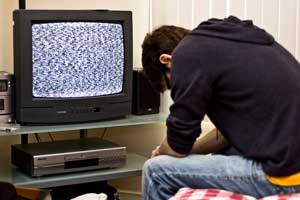How to Watch Less TV
7 great reasons to watch less TV, plus 5 tips to achieve it
 "How to Watch Less TV" courtesy of skippyjon
"How to Watch Less TV" courtesy of skippyjonNote: this article was written before the explosion of social media and phone usage. You'll see that the same message applies.
You've maybe heard it said that as a person is drowning, their whole life plays before their eyes. But imagine if most of your memories are not yours at all but made up of thousands of hours of other people's experiences.
Many people's future memories will be passively absorbed chunks of other people's lives glimpsed from tens of thousands of hours glued to TV. Will you be one of those people?
"Now hold on a channel-hopping second! What's wrong with idling life away in front of the TV?" you may ask. Well, it depends what you want for yourself.
This is what you're watching – and how much?
The average American watches more than four hours of TV each day; 28 hours a week. This equates to two months of nonstop TV watching per year. In a 65-year life, that person will have spent nine continuous years glued to the 'brain drain'. That's a lot of your own life to be handing over passively (1). After all, we human types don't live all that long.
By the time the average U.S. child turns 18, they will have seen 200,000 acts of violence on TV, including 40,000 murders. American television is broadcast (and copied) around the globe, so TV abuse is truly an international problem. No wonder chronic TV usage may even be bad for your sanity.
Watch less TV to save your sanity?
At a meeting in Nashville, Tennessee in July 2007, Dr John Nelson of the American Medical Association said that if 2,888 out of 3,000 studies show that television violence is a causal factor in real-life antisocial behaviour, then mass TV consumption is a "public health problem."
Still, it could be argued that even this isn't necessarily a bad thing if watching TV makes most of us happier; but, on the whole, it doesn't. And here's why:
Proven: Too much TV watching makes you unhappy
Unhappy people tend to watch more TV. No surprises there. Unhappiness makes us passive and makes us want to 'escape' into mind-numbing absorption. In this way, TV can act very much like a drug. And it's easy to use, instant, legal, and needs no extra money to engage in it (once you've got your TV and, in some countries, a license).
Psychologists found that happy people socialize more, read more, and have more sex - but watch less television. John Robinson and Steven Martin of the University of Maryland also discovered that those who are unhappy watch up to 30 percent more television than happy people (2). But what is cause and what is effect? Could it be that we watch more TV when we are unhappy but, in turn, watching TV makes us unhappy?
Heavy TV (and computer game) users report feeling less happy and more anxious than light users and mood seems to deteriorate after usage as opposed to before a period of watching (3). The fast panning in and out, changes in volume, and other modern edit techniques exhaust the human capacity to focus (and constantly refocus); which is why we can feel 'rinsed out' but not rested after watching TV for hours. I'd personally recommend that depressed people limit their TV usage, as it can be exhausting and damaging for mood and impair sleep.
So, too much TV can make us feel less happy, but it also makes us less creative, self–motivated, and able to concentrate. It seems that too much tele-gazing can also restrict cognitive development and make us less able to problem solve.
The heavy toll of heavy TV usage
Heavy TV watchers tend to use it to 'wind down', but it quickly makes us very passive because all the ideas and energy come from other people, causing lack of motivation and procrastination. Television makes wallflowers of us all; nonparticipants in life's events. Of course, some television might be engaging and stimulating and genuinely teach us new things, but the average indiscriminate TV diet contains way too much junk.
When TV is introduced into communities, "both adults and children become less creative in problem solving, less able to persevere at tasks, and less tolerant of unstructured time" (4). Kids exposed to too much TV (even if it's just on "in the background") show impaired focus, vocabulary, and cognitive development (5). So TV can make us unhappy and dumber; and, of course, time spent rotting in front of TV also makes us fatter.
Watch less TV to get slimmer
Of course inactivity piles on the old fat and means we chronically underuse our organs and muscles to the point where they can become less efficient, but there are other reasons why TV viewing can make us fat. For instance, eating while watching television has been shown to increase food intake partly due to the distracting effects of television viewing itself (6).
Amazingly, researchers found that watching TV whilst eating lunch increased the likelihood of afternoon snacking because TV interfered with the full memory of having eaten before being encoded. So one way to eat less is to be fully aware when we are eating; and TV may chronically interfere with this process.
There is yet another possible danger to TV overdosing.
Watch less TV to feel better about yourself
Being smarter, better able to problem solve, and having all that extra time to have your own experiences and learn new things will improve your self–esteem, but I also think that excessive TV viewing may have a damaging effect on self-esteem for another reason.
The average person depicted on TV tends to be slimmer, richer, and much better looking than the average 'real life' person (at least in my life). If we get into the habit of comparing ourselves unfavourably with people from 'TV Land', then our perception of ourselves may suffer from these unrealistic comparisons.
Okay, now having said all this, I'd like to make it clear that, yes, I too watch TV. There, I've said it. I slump; I lounge; I flake out; I've been known to goggle at the magic source of light in the corner, limp-jawed like some lobotomized, intoxicated, antisocial baboon. But, generally and genuinely, I like to control my usage and have found the following ways useful. So if you want to watch less TV, then I hope you'll find these tips helpful, too.
1) Switch on/switch off
It sounds obvious, but I think the worst kind of TV viewing is totally indiscriminate; just viewing whatever happens to be on, regardless of whether you'd really choose to watch it in your right (non-TV head) mind. If I want to see a TV movie, I will discipline myself to switch on at the start and off at the end. Sure, I could catch the news afterwards, then watch that must-see show about over-indulged Pekinese.
But the fact is, when you're trapped in TV Land, everything starts to seem like a good viewing idea. Tell yourself: "Okay, at 8:00 I'm switching on to watch ________, then I'm going to switch off again and have a bath/read my book/make that call/achieve world peace."
2) Have TV-free days
Most of us like to watch TV sometimes, but handing over large chunks of your life in exchange for viewing stuff you don't even much like is such a waste. Start to make one day a week totally non-viewing. Plan to do other stuff with this time. Read, go out and meet friends, take up a sport, or learn some other activity - TV won't miss you.
Develop yourself in some way. It may feel weird at first (depending on how chronic your usage is), but pretty soon you'll find you're looking forward to your TV-free days as you start to wean yourself off that emotionally manipulative life drainage set.
3) Watch less TV by reminding yourself of why you want to watch less TV
Make a habit of rereading this article and reminding yourself that to be 'more alive' - that is, to live your life through your own experiences - you need to watch less TV. Remind yourself that you'll sleep better when you watch less TV in the evenings and, specifically, when you switch off earlier.
Remind yourself that anyone who ever achieved anything would have had to have limited their television viewing (Napoleon, the Buddha, Sir Isaac Newton – err, I'm joking here, obviously; but you get my gist).
If you watch an hour a day, you'll still clock up 30 hours a month; over a ten-year period, that's still 152 continuous days just watching television. If you took that time to learn anything, you could become a world expert.
TV really is the new "opium of the people".
4) Watch less TV by getting outside more
Yes, I know; TV can be viewed pretty much anywhere. But if you're outside in natural light, you are less likely to waste time with TV. Most people watch TV indoors, which means they miss out on essential vitamin D sources and good old fresh air.
There is evidence that being outside (even on a cloudy day) can improve our mood and aid our night-time sleep (7); and walking regularly has been shown to be better at lifting depression than antidepressants (8). Remember: TV is essentially a depressant, so you'll need to do something active to counteract its draining effects.
5) Envisage yourself leading another kind of life
It can be hard to change unless we first envisage changing. Sit down and relax, clear your mind (and make sure the television is OFF). Now imagine a TV (you can do this), but begin to picture seeing yourself on that TV, going about a new routine in which television watching plays a much lesser role. Observe yourself coming in and delaying using the TV, or sometimes not using it at all. Watch yourself naturally and easily doing all kinds of other things until you look totally natural being TV-free.
TV is everywhere. It has become background environmental noise; a kind of unnoticed noise pollution. People even sometimes have it on 'in the background' when they have guests round. And in the UK, you can barely go into a pub without the distracting electric flickering of TV constantly calling you, siren-like, away from your social connections and back to the banality of TV Land.
Now, what were the words of the song? Ah, I know: "He not busy being born is busy dying..."
References
- According to the A.C. Nielsen Co., who conducted research into TV habits, and research data compiled by TV-Free America, 1322 18th Street NW, Washington, DC 20036.
- The American researchers formed their conclusions after analyzing the social habits of 30,000 people between 1975 and 2006.
- See: Kubey, R. and Csikszentmihalyi, M. (2002) "Television addiction is no mere metaphor." Scientific American, Feb edition, 62-68.
- Ibid.
- A study published in the Archives of Pediatrics and Adolescent Medicine showed that simply having the TV on in the background can stifle interaction between parent and child, decreasing the number of words spoken and possibly slowing the development of a baby's language skills. Scientists have long suspected that TV viewing can damage early development. In fact, the American Academy of Pediatrics recommends avoiding exposure to television before an infant is two years old, a period when important cognitive changes take place. "We've known that television exposure during infancy is associated with language delays and attentional problems, but so far it has remained unclear why," said lead researcher Dimitri Christakis. The researchers investigated by attaching sensors to both parents and their children between the ages of two months and four years. On sporadic days over a period of a month, the sensors recorded every word spoken or heard by the subjects. If a television was on, words emanating from the TV were counted, although researchers did not differentiate between whether subjects were actively watching the tube, or just had it on in the background as they went about other tasks. This technology allowed Christakis's team to quantify exactly the degree to which TV viewing can cripple parent-child communication: for every hour a television was turned on, babies heard 770 fewer words from an adult, the new study found.
- Using a repeated-measures design, 16 young female undergraduate students visited a laboratory to eat a fixed lunch, either while watching television or in the absence of television. Their intake of cookies at a tasting session later that afternoon was measured, and participants recalled eating the lunch and rated the memory for vividness. All participants ate all of the lunch and their rated appetite during lunch did not differ according to condition. Participants ate significantly more cookies after they had eaten their lunch while watching television than when they had eaten their lunch while not watching television, and this effect could not be attributed to an effect of television watching on rated mood or appetite before the snack session. Watching television while eating lunch was also associated with reduced vividness ratings of the memory of the lunch. These results suggest that the effects of television watching on food intake extend beyond the time of television watching to affect subsequent consumption. They further suggest that this effect may be related to an effect of television watching on encoding of the memory of the meal. (Suzanne Higgs and Morgan Woodward, School of Psychology, University of Birmingham, United Kingdom.)
- A type of depression called seasonal affective disorder affects some people during the winter when they don't get enough sunlight. Experts now believe that sunlight has widespread mood-elevating effects, possibly because the 'happy' hormone serotonin increases when nights are short and days are long. In fact, psychiatrists often recommend that depressed individuals go outside in the sun for 30 minutes a day. Bonus: You can slather on all the sunscreen you want and still reap the mood benefit.
- James A. Blumenthal, Ph.D. and his colleagues surprised many people in 1999 when they demonstrated that regular exercise is as effective as antidepressant medications for patients with major depression. The researchers studied 156 older adults diagnosed with major depression, assigning them to receive the antidepressant Zoloft (setraline), 30 minutes of exercise three times a week, or both. According to Blumenthal, "Our findings suggest that a modest exercise program is an effective, robust treatment for patients with major depression who are positively inclined to participate in it. The benefits of exercise are likely to endure particularly among those who adopt it as a regular, ongoing life activity."






